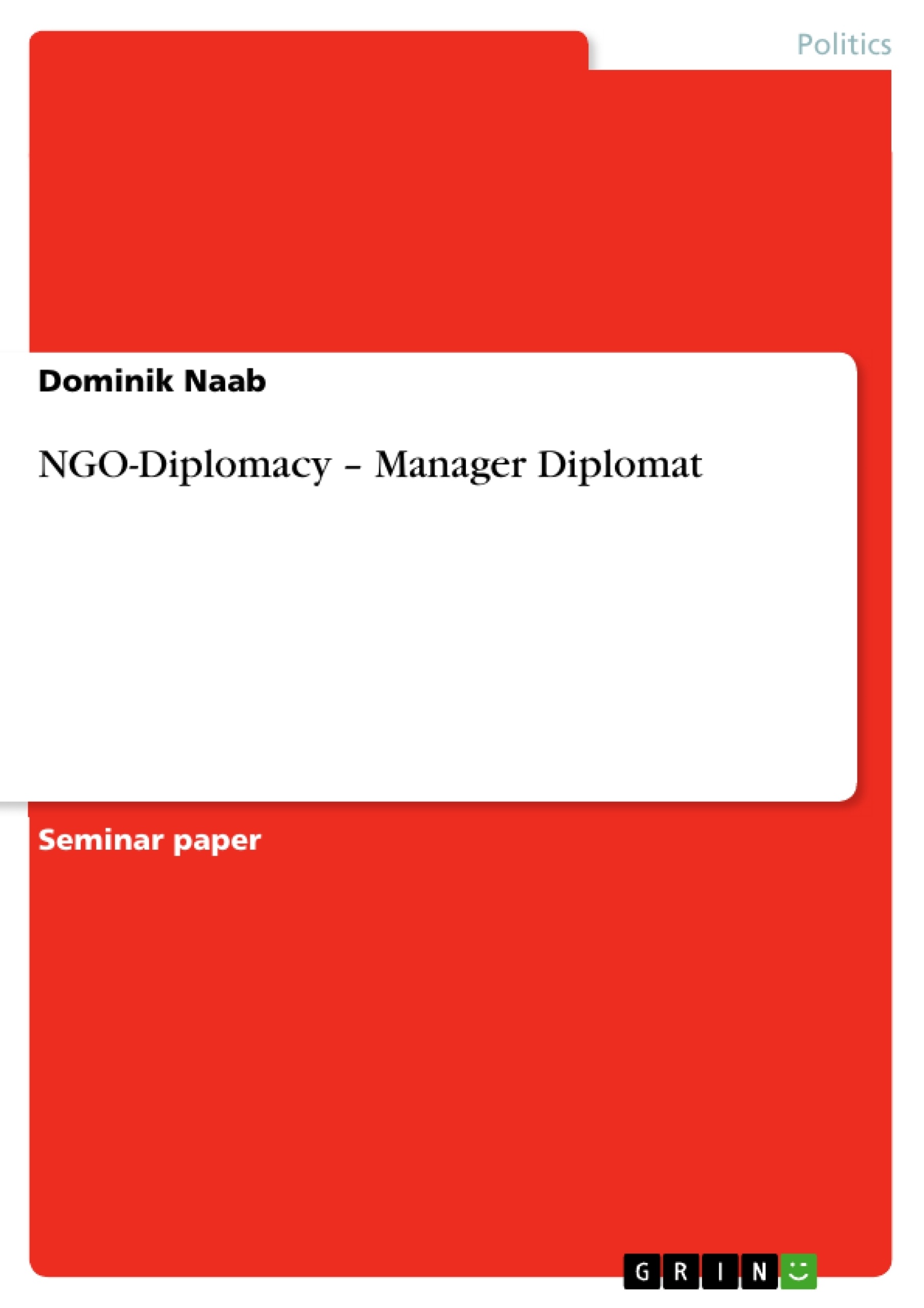The realistic point of view that international relations are only ruled by states is definitely passé. The states are no longer a black box. The increasing number and impacts of civil society influences not only the national sphere but also the international arena. This development has its impacts on diplomacy. Diplomacy is no longer state‐centric. Non‐state actors like non‐governmental organisations (NGO) and multinational corporations (MNC) play a significant role in international relations. Some scholars even state that they are more important than states. (Cooper/Hocking 2000:362) We can assume that certain NGOs and MNCs are definitely more relevant than some states. The fact that some MNCs earning capacity and financial resources are higher than the one of states has a lot to commend this assumption. In a ranking of states and MNCs by size of earning in 2005‐2006 the twentieth is Wal‐Mart with $288 billion after Sweden with $321.4. Beside Wal‐Mart there are British Petroleum ($285.1 billion) and Exxon Mobil ($270.8 billion) which are in the ranking before states like Turkey ($268.7 billion) and Austria (25. / $262.1 billion). In the top fifty are fourteen MNCs and in the following fifty up to place one hundred there are thirty‐six MNCs and only fourteen states. It’s the contrast to the top fifty and with a total look on the top hundred there are fifty percent states and fifty percent MNCs. These numbers illustrate well the huge impact of non‐state actors in global and national governance.
Inhaltsverzeichnis (Table of Contents)
- New relevant actors in international relations
- Definition NGO
- NGO diplomacy - managers or diplomats?
- NGO diplomacy - methods and tools
- Case study: The Ottawa Process
- Conclusion and lesson for the future
Zielsetzung und Themenschwerpunkte (Objectives and Key Themes)
This paper examines the role of non-governmental organizations (NGOs) in international relations, specifically focusing on their diplomatic activities. It aims to define the term "NGO" and explore the strategies used by NGOs to influence international policymaking. The paper uses a case study of the Ottawa Process to illustrate the diplomatic approach of NGOs.
- The rise of NGOs as significant actors in international relations.
- The definition and characteristics of NGOs, distinguishing them from other non-state actors.
- The nature and methods of NGO diplomacy, examining their strategies for influencing policy.
- The role of NGOs in international policymaking, focusing on the case study of the Ottawa Process.
- The future of NGOs in international relations and their potential impact.
Zusammenfassung der Kapitel (Chapter Summaries)
- New relevant actors in international relations: This chapter highlights the growing influence of non-state actors, particularly NGOs and MNCs, in international relations. It argues that these actors have become increasingly important in a globalized world, challenging traditional state-centric diplomacy.
- Definition NGO: This chapter provides a clear definition of NGOs, distinguishing them from other non-state actors such as intergovernmental organizations, liberation movements, and multinational corporations. It emphasizes the non-profit nature of NGOs and their commitment to social and political objectives.
- NGO diplomacy - managers or diplomats?: This chapter explores the functions and strategies employed by NGO staff involved in diplomacy. It examines similarities and differences between their roles and those of traditional diplomats and corporate managers, raising the question of how best to categorize their activities.
- NGO diplomacy - methods and tools: This chapter discusses the specific methods and tools used by NGOs in their diplomatic efforts. It presents a detailed case study of the Ottawa Process, illustrating how NGOs have successfully leveraged their resources and influence to shape international policy.
Schlüsselwörter (Keywords)
The main keywords and focus topics of this paper include: NGOs, diplomacy, international relations, non-state actors, multinational corporations (MNCs), policy influence, strategic planning, Ottawa Process, civil society, global governance, and international organizations (IOs). The paper explores the emerging role of NGOs in international affairs, examining their methods and effectiveness in shaping policy and influencing decision-making processes.
Frequently Asked Questions
What is NGO Diplomacy?
It refers to the diplomatic activities and policy influence exerted by non-governmental organizations in the international arena, moving beyond state-centric diplomacy.
Are multinational corporations (MNCs) more powerful than states?
The paper notes that some MNCs, like Wal-Mart or Exxon Mobil, have higher earning capacities than the GDP of states like Turkey or Austria.
What was the "Ottawa Process"?
It is a key case study illustrating how NGOs successfully led an international movement to ban landmines, showcasing their diplomatic power.
How do NGOs influence global governance?
They use methods such as strategic planning, lobbying, public campaigns, and expert consultation to shape international treaties and policies.
Why is diplomacy no longer "state-centric"?
Because non-state actors like NGOs and MNCs now play a significant role in international relations that were previously dominated only by governments.
- Quote paper
- Dominik Naab (Author), 2010, NGO-Diplomacy – Manager Diplomat, Munich, GRIN Verlag, https://www.grin.com/document/197756



